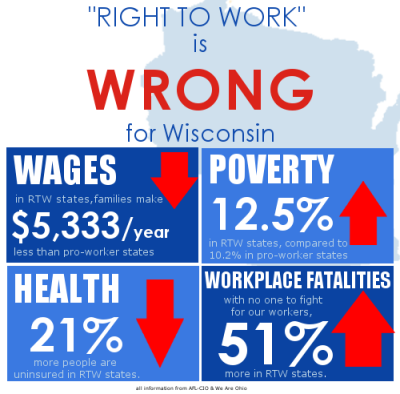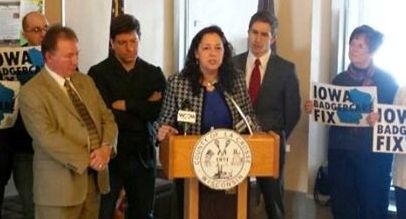
|
|

CONTACT ME:
State Capitol
Room 307 West
P.O. Box 8953
Madison, WI 53708
Phone: (608) 266-5780
Toll Free: (888) 534-0095
rep.billings@legis.wi.gov
Connect with me on social media:
![]()
![]()
|
COMMUNITY EVENTS |
American Southwest Exhibition
Description: On his explorations across the American Southwest,
photographer Chris Hood captured the beauty of locations in Utah and
Arizona from angles that would be typically unseen by most human eyes.
Date: Wednesday, Feb. 25 - Sunday, April 4.
Location: The Pump House Regional Art Center
La Crosse Bike Swap
Description: Come to the swap to re-home your dusty bikes, parts,
and accessories. Any bikes unsold at 2 pm must be picked up or they
will be donated to Logan Bike Works.
Date: Saturday, Feb. 28, 10 a.m. - 2 p.m.
Location: Logan Middle School
|
FUN FACT |
Do you know why Wisconsin is named the Badger State?
Surprisingly, it's not just because badgers are native to our state! Back in Wisconsin's history, all the way back to the 1800s, miners dug tunnels into hillsides as they searched for lead and then lived in them during the winter months to keep warm. The tunnels miners lived in reminded people of similar habitats of badgers, and Wisconsin became known as the badger state.
Friends and Neighbors,
This week, Wisconsin faced a number of proposals that could make or break Wisconsin's economic future. "Right to Work" and Medicare expansion have been prominent national issues for a number of months, sparking a great deal of discussion in Wisconsin. Wisconsin-based proposals of each issue were introduced in our legislature earlier this week. Read on to learn about the impacts of these legislative moves, in addition to news on other state and community issues.
Best Wishes,

Jill Billings
State Representative
95th Assembly District
|
Harmful Right to Work Proposals Being Considered in Wisconsin |
|
This week, Republicans held an emergency session for the purpose of introducing Right to Work (RTW) legislation. Despite Gov. Walker's having called RTW a "distraction" earlier in the year, he has suddenly turned about-face, and is ready to sign legislation should it reach his desk. But the distraction is not why I oppose this legislation. I oppose it because of the real negative impacts it will have on La Crosse families and individuals. On a large scale, it will lead to lower wages across private and public sectors. Lower wages would affect our economy as a whole, significantly decreasing household contributions to our local businesses, and damaging the Wisconsin economy. On a personal level, however, Right to Work can have just as damaging of effects. Right to Work eliminates employees' abilities to negotiate for workplace safety. In Right to Work states, workplace fatalities increase by 51 percent. In Wisconsin this could mean that, for example, nurses would be unable to negotiate their maximum work hours. This could cause a significant issue for both workers and patients - as overworked employees create a grave health concern.
|
|
BadgerCare Funding Proposal Would Save State $241 Million |
|
This week I signed on as a co-author to a bill that would save Wisconsin $241 million. Representative Daniel Riemer and Senator Jon Erpenbach have introduced a bill that would adopt a modified version of federal BadgerCare expansion, modeled after Medicaid expansion in Iowa. This bill would save Wisconsin $241 million over the next two years and impact more than 80,000 Wisconsinites.
For over a year, Wisconsinites have urged Gov. Walker to accept federal funding dollars for BadgerCare. Early estimates indicated that accepting funds would save the state approximately $345 million over the next two years and protect the health care security of nearly 38,000.
After Walker's budget proposal was announced, federal funding became even more lucrative, as it could stop cuts to essential Wisconsin programs like the UW-System and K-12 education.
This week, myself along with Rep. Steve Doyle, Rep. Chris Danou, and Rep. Daniel Riemer spoke on the importance of accepting federal BadgerCare funding in Wisconsin [pictured].
Currently, our tax dollars are going to the federal government and being distributed to other states because he won't take the money. We want our tax dollars back in our state.
|
|
February is Teen Dating Violence Awareness Month |
|
February is Teen Dating
Violence Awareness Month. Teen dating violence is a problem
affecting youth in every community across the nation. One in
three young people are affected by physical, sexual, or verbal
dating violence. Unfortunately, this often goes undetected as
only 33 percent of teens who are in an abusive relationship ever report
abuse.
|
If you would like to have your name removed from this email list, please reply to this message with “Unsubscribe” in the subject line

